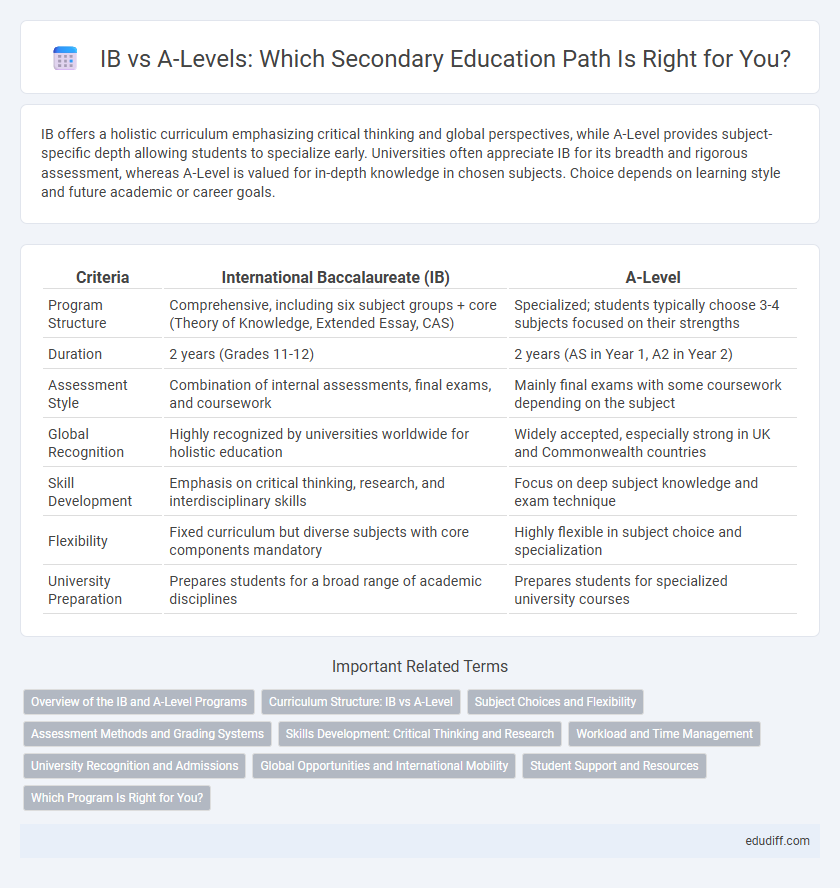IB offers a holistic curriculum emphasizing critical thinking and global perspectives, while A-Level provides subject-specific depth allowing students to specialize early. Universities often appreciate IB for its breadth and rigorous assessment, whereas A-Level is valued for in-depth knowledge in chosen subjects. Choice depends on learning style and future academic or career goals.
Table of Comparison
| Criteria | International Baccalaureate (IB) | A-Level |
|---|---|---|
| Program Structure | Comprehensive, including six subject groups + core (Theory of Knowledge, Extended Essay, CAS) | Specialized; students typically choose 3-4 subjects focused on their strengths |
| Duration | 2 years (Grades 11-12) | 2 years (AS in Year 1, A2 in Year 2) |
| Assessment Style | Combination of internal assessments, final exams, and coursework | Mainly final exams with some coursework depending on the subject |
| Global Recognition | Highly recognized by universities worldwide for holistic education | Widely accepted, especially strong in UK and Commonwealth countries |
| Skill Development | Emphasis on critical thinking, research, and interdisciplinary skills | Focus on deep subject knowledge and exam technique |
| Flexibility | Fixed curriculum but diverse subjects with core components mandatory | Highly flexible in subject choice and specialization |
| University Preparation | Prepares students for a broad range of academic disciplines | Prepares students for specialized university courses |
Overview of the IB and A-Level Programs
The International Baccalaureate (IB) program offers a comprehensive curriculum emphasizing critical thinking, global perspectives, and formative assessment through its six subject groups and core components including the Extended Essay and Theory of Knowledge. In contrast, A-Level programs provide subject-specific specialization, allowing students to focus intensely on three to four subjects, with assessments primarily based on final examinations. Both programs are widely recognized by universities worldwide, but IB's holistic approach contrasts with A-Level's depth within chosen disciplines.
Curriculum Structure: IB vs A-Level
The IB curriculum features a holistic, interdisciplinary framework requiring students to study six subjects across multiple disciplines, including language, sciences, and humanities, along with core components like the Extended Essay, Theory of Knowledge, and Creativity, Activity, Service (CAS). A-Level curriculum emphasizes in-depth specialization, allowing students to focus on three to four subjects tailored to their future academic or career interests, with greater flexibility in subject choice and assessment timing. The IB aims to develop critical thinking and global awareness through its comprehensive course load, while A-Levels prioritize subject mastery and detailed knowledge in selected fields.
Subject Choices and Flexibility
IB offers a broad curriculum requiring students to study six subjects across multiple disciplines, promoting balanced knowledge but limiting specialization. A-Level provides greater flexibility by allowing students to specialize in three or four subjects of their choice, enabling deeper focus in preferred areas. The choice between IB and A-Level depends on whether breadth or specialization aligns better with a student's academic goals and career plans.
Assessment Methods and Grading Systems
The International Baccalaureate (IB) employs a combination of internal assessments, extended essays, and final exams, emphasizing critical thinking and research skills, with grades awarded on a scale of 1 to 7. In contrast, A-Level relies primarily on external examinations at the end of the course, graded from A* to E, highlighting subject mastery and memorization. IB's holistic approach integrates continuous assessment and coursework, while A-Level focuses on end-of-course exam performance.
Skills Development: Critical Thinking and Research
IB emphasizes interdisciplinary learning and inquiry-based approaches that cultivate advanced critical thinking and research skills through extended essays and Theory of Knowledge courses. A-Level promotes deep subject-specific knowledge, encouraging analytical thinking and research primarily within individual disciplines, often facilitated by coursework and practical assessments. Both curricula develop strong cognitive abilities, but IB offers broader skill application across multiple fields while A-Level ensures in-depth expertise in chosen subjects.
Workload and Time Management
IB demands a rigorous workload with extended essays, internal assessments, and multiple subjects studied concurrently, requiring strong time management and organization skills. A-Level offers a more focused approach with fewer subjects, allowing students to allocate more time per course and manage workload more flexibly. Effective time management in IB is crucial to balancing the comprehensive curriculum, while A-Level students benefit from concentrated study periods on fewer topics.
University Recognition and Admissions
IB diplomas are widely recognized by universities globally, often providing an advantage in admissions due to their emphasis on critical thinking and a balanced curriculum. A-Level qualifications, prevalent in the UK and Commonwealth countries, are highly respected for their depth in specific subjects and are accepted by top-tier universities worldwide. Many institutions use IB scores and A-Level grades interchangeably but may prefer IB for its holistic assessment and A-Levels for subject specialization.
Global Opportunities and International Mobility
The IB Diploma is recognized by universities in over 140 countries, offering students extensive global opportunities and facilitating smoother international university admissions. A-Level qualifications are widely accepted in the UK, Commonwealth nations, and several international institutions but may require additional validation elsewhere. The IB's emphasis on a holistic, interdisciplinary curriculum enhances international mobility by aligning with diverse educational systems worldwide.
Student Support and Resources
The International Baccalaureate (IB) program offers robust student support through personalized mentoring, extensive counseling services, and access to a wide range of learning resources tailored to diverse educational needs. A-Level courses provide specialized tutoring and exam preparation materials, with many schools offering additional academic workshops and study groups to enhance student understanding. Both curricula emphasize comprehensive support systems, but IB's holistic approach integrates emotional and academic assistance to better prepare students for global challenges.
Which Program Is Right for You?
Choosing between the IB and A-Level programs depends on your learning style and academic goals. The IB curriculum offers a holistic education with interdisciplinary subjects and encourages critical thinking, ideal for students aiming for universities valuing well-rounded knowledge. A-Levels provide specialization with in-depth study of fewer subjects, suited for learners who prefer focused expertise and clear subject strengths.
IB vs A-Level Infographic

 edudiff.com
edudiff.com